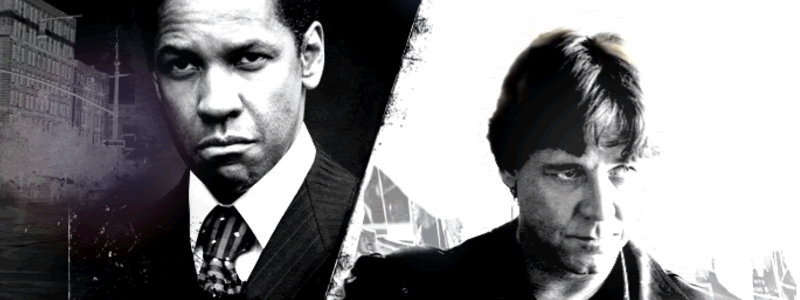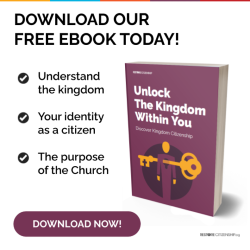This article explores the clash between the cultures of the kingdom of God and the kingdoms of the world.
RICHIE: This isn't a couple of bucks.
RIVERA: It's the same thing. In principle.
RICHIE: We're talking about principle?
RIVERA: Richie, a cop who turns in this kind of money says one thing: He'll turn in cops who take money. We'll be pariahs.
This extract from the crime drama American Gangster signifies a defining moment for one of the central characters named Richie. The film is based in New York, a city full of corruption where officer and criminal shake hands behind closed doors. Behind every good act in the city there is always an ulterior motive. The relevance of this quote will be discussed later in the article.
In the Old Covenant the Lord repeatedly commanded the nation of Israel to destroy the inhabitants of Canaan when they entered the land (Exodus 34:11-12). Upon the Mount of Sinai, the Lord hewed tablets and by His hands engraved the 10 commandments upon them. This was broken in anger by Moses upon seeing the idolatrous revelry the Israelites indulged in, in his absence. Thus Moses hewed out a second pair of tablets and wrote on it the same laws.
However many people may disagree with this point as this is a contested issue. Nevertheless any human involvement weakens administration process of the covenant.
There is a significant difference between the two tablets. The first tablets were hewed by the Lord and written by His hands (Spirit). The second was hewed by Moses and written by his hand (flesh). Thus the former is called the law of the Spirit and the latter the carnal Law. Thus the difference is not the law itself; i.e. the words of the law are the same on both tablets. However, the distinction is in how the law is mediated in the heart. The law is the standard that the nation of Israel is to obey, and mediation is the ability for the Lord to legislate His will in our hearts.
The Lord required the Israelites to uphold the standard. The capacity to keep the law can only be done through the mediation of the Spirit. Since the Israelites lacked the capacity, they could not uphold and maintain obedience to the law. Thus they were susceptible to being seduced. This is seen when the men of Israel committed fornication with the women of Moab and ate that which is sacrificed to the idol Baal (Numbers 25). This scheme originated in the mind of Balaam the Soothsayer; intending to put a stumbling block in the Israelites path to please the King Balak of Moab. Instead of destroying the idolatrous nation of Moab they participated with them in sin; thus arousing the anger of the Lord. The mediation of the carnal law could not produce a maturity from the Israelites that will generate a culture that will be delivered successfully to the next generation. After centuries the culture of the Israelites deteriorated for failing to pass down the correct values to the next generation and upholding the laws of the kingdom.
In contrast, in the New Covenant the citizen’s capacity to obey the law can be achieved. The prophecy of Jeremiah that the mediation of the Law will be written upon our hearts (Jeremiah 31:31-34) is fulfilled by the pouring out of the Spirit. Thus the Law of the Spirit should be operating in every citizen in the new covenant producing a distinct unadulterated culture. In the new covenant the mediation of the Lord is perfect; His ability to legislate the will of God goes beyond that of the Old covenant.
Therefore God has great confidence to place His citizens in the midst of idolatrous nations and in the systems of this world. This suggests the confidence He has in His mediation to produce the outcome He expects. The Lord is certain that the culture that is produced from His citizens is potent enough to permeate even the most dominant of cultures. Any territory His citizens are in; the kingdom prescribes that each citizen governs within the ecclesia, legislating the laws of the kingdom. Thus the culture of the kingdom will infiltrate the surrounding nations and overturn the neighbouring governments; hence Theocracy becomes the ruling government in each territory it is located.
Lets take Matthew 7: 17-20 for instance. Within these verses you can presume that both the bad and good tree is located in the same field. The only way to identify a bad tree is to taste its fruit. Likewise the only way to identify a false citizen from a true citizen is to experience their culture. This is the defining signpost.
Equally in the film American Gangster a defining indicator of attitudes and motives of each character is seen by the refusal of Richie the police officer. Richie refuses to take the drug money left in the car. There is nearly a million dollars in the bag found in the stolen car. The temptation is to take the money, knowing none will be the wiser. In this police force it is even expected of you, as most of the officers are corrupted. A good cop is not to be trusted, thus at this moment when Richie hands the money back to his base, a line has been drawn. His identity as a non- corrupt police officer leaves him isolated. The uniform all police officers may wear is the same; however, the only indicator that reveals their true character is seen in the choices they make in various situations.
Thus in the Kingdom of God, the same is true; to know whether the character of a citizen is in keeping with the King, the signpost is the culture that is produced. The kingdom of God has a filter; God filters out all who do not produce a culture in keeping with His laws. God will cut down every bad tree generating horrible and bitter fruit. If the culture we produce does not correspond with the culture He expects, then it is for the Lord to decide how He handles such. Thus the old order faded away, as it did not produce the longevity He intended.
Let us be aware that our culture may clash with other cultures, however the laws that underpin our culture are superior and will prevail. We represent the King. He is confident in what He has deposited within us, and the outcome He expects. Let us place our assurance in the King knowing that knowledge fosters maturity and maturity produces a dominant culture. This is the signpost of the Kingdom; this is what directs people to experience the wealth that the King has to share.
Be the signpost wherever you are.





